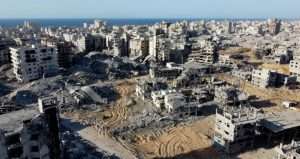Dam helped stop flooding says Ethiopia, accused of flooding Sudan

Ethiopia is being accused of causing severe flooding across Sudan just weeks after the Grand Ethiopian Renaissance Dam (GERD) opened, according to The Associated Press, September 29.
Sudan, a downstream neighbour of Ethiopia, issued flooding alerts across the country starting September 27. The government in Sudan are reported to have issued warnings to citizens across the provinces of Khartoum, River Nile, White Nile, Sennar and Blue Nile, with the country’s irrigation ministry saying that water levels in the area have been higher than normal for 4 consecutive days due to dams in the area releasing excess water.
The Ministry has warned locals in the affected regions to remain in their homes and to be prepared for disruption to crops and agriculture.
According to experts, the water levels in the region are expected to slowly decrease over the course of this week.
It has been less than a month since Ethiopia inaugurated the GERD; now that the $5 billion infrastructure project is online, it may already find itself at the centre of the very problems countries such as Egypt and Sudan have been warning the international community about for years.
GERD is located on the Blue Nile near the country’s border with Sudan. Besides being Africa’s largest dam, it has become a symbol of national pride and unity in a divided Ethiopia, with the dam expected to produce more than 5000 megawatts of electrical power, more than doubling the country’s current supply.
Although the newly operational dam is expected to greatly increase the potential of Ethiopia, many people are critical, accusing the dam of causing the floods now seen in Sudan.
Abbas Sharaky, a Professor of Geology and Water Resources at Cairo University, explained; “The situation is the result of a man-made error.”

The dam is not entirely problematic in the case of Sudan, with GERD actually being helpful to farmers during the agricultural season. However, Sharaky notes that “the current situation is causing more harm than good because the harvest season has almost ended.”
He suspects that part of the reason we are now seeing flood warnings in Sudan is because Ethiopia’s rainy season between July and August concluded without the authorities gradually emptying the dam, as would be expected for that time of year given the stress it places on the structure.
Professor Sharaky believes the reason Ethiopian authorities failed to empty their reservoir was due to 4 of the turbines on the dam failing to open, preventing the crew from reducing excess water levels, which then culminated in excess flow finally making its way into Sudan this week.
He laid his criticism at the feet of Ethiopian officials, who have said repeatedly that the turbines were operational, which he now says appears to be a blatant lie given the release of excess water.
Several days ago, Habtamu Itefa Geleta, Ethiopia’s Water Minister seemed to explain away the expert’s analysis, saying “The flood in Sudan could be from White Nile. If GERD was not there, the magnitude could have been devastating. GERD played a significant role in reducing the catastrophic effect.”
Although reports remain incomplete about the cause of the flooding, one thing is for certain; Addis Ababa is running damage control through their public statements. For example, when the Minister was asked directly about the functionality of the turbines, they dodged the question: “We did not release the excess water.”
Meanwhile, Egypt-who has been a persistent thorn in the side of Ethiopia from start to finish on the project-points out the recurring opportunities that Ethiopia has deliberated failed to negotiate with Egypt and other downstream countries for a binding agreement on GERD. Instead, they say, their Nile water rights have been cast aside, despite the integral and even existentially dangerous a lack of water access could cause to Ethiopia’s downstream neighbours.
Tamim Khallaf, a spokesperson for the Egyptian foreign ministry demonstrated this deep dissatisfaction with the situation on September 4, just a few days before GERD was opened.
In a statement he said that Ethiopia constructed GERD “unilaterally without any prior notification, proper consultations, or consensus with downstream countries, thereby constituting a grave violation of international law and posing an existential threat.”
The Associated Press, Maghrebi.org
Want to chase the pulse of North Africa?
Subscribe to receive our FREE weekly PDF magazine















